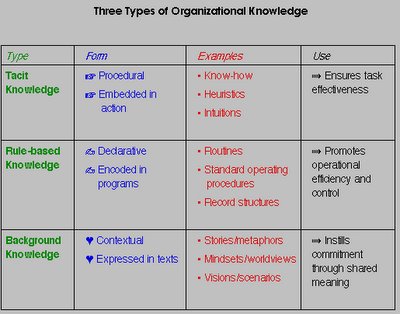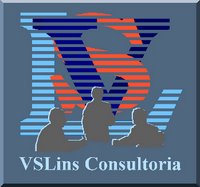The Intelligent Organization
Three classes of knowledge
"What magical trick makes us intelligent? The trick is that there is no trick. The power of intelligence stems from our vast diversity, not from any single, perfect principle. Our species has evolved many effective although imperfect methods, and each of us individually develops more on our own. Eventually, very few of our actions and decisions come to depend on any single mechanism. Instead, they emerge from conflicts and negotiations among societies of processes that constantly challenge one another."
(Marvin Minsky 1986, The Society of Mind, Section 30.8)
An organization works with three classes of knowledge: tacit knowledge, rule-based knowledge, and background knowledge (Table 1.1). Tacit knowledge consists of the hands-on skills, special know-how, heuristics, intuitions, and the like that people develop as they immerse in the flow of their work activities. Tacit knowledge is deeply rooted in action and comes from the simultaneous engagement of mind and body in task performance.
Tacit knowledge is personal knowledge that is hard to formalize or articulate (Polanyi 1966, 1973). The transfer of tacit knowledge is by tradition and shared experience, through for example, apprenticeship or on-the-job training. Tacit knowledge in an organization ensures task effectiveness - that the right things are being done so that the work unit could attain its objectives. It also provides for a kind of creative robustness - intuition and heuristics can often tackle tough problems that would otherwise be difficult to solve.
Whereas tacit knowledge is implicit, rule-based knowledge is explicit knowledge that is used to match actions to situations by invoking appropriate rules. Rule-based knowledge guides action by answering three questions: What kind of situation is this? What kind of person am I or What kind of organization is this? and finally, What does a person such as I, or an organization such as this, do in a situation such as this? (March 1994) Rule-based knowledge is used in the design of routines, standard operating procedures, and the structure of data records.
Rule-based knowledge enables the organization to enjoy a certain level of operational efficiency and control. It also promotes equable, consistent organizational responses. The third kind of organizational knowledge is background knowledge. This is knowledge that is part of the organizational culture and is communicated through oral and verbal texts such as stories, metaphors, analogies, visions, and mission statements. Background knowledge supplies the mindset or worldview by which people in the organization understand particular events, actions, objects, utterances, or situations in distinctive ways (Morgan 1986). Background knowledge draws the cognitive context for the construction of reality and endows meaning on the organization's actions and activities. It promotes commitment through the creation of shared meanings and values.
All three forms of knowledge can be found in any organization. The intelligent organization however, is skilled at continuously expanding, renewing, and refreshing its knowledge in all three categories. The intelligent organization promotes the learning of tacit knowledge to increase the skill and creative capacity of its employees, takes advantage of rule-based knowledge to maximize efficiency and equability, and develops background knowledge to unify purpose and meaning in its community. In effect, the intelligent organization has mastered a fourth class of knowledge - a higher order or meta-knowledge - that it uses to create, integrate, and invigorate all its intellectual resources in order to achieve superior levels of performance.



<< Home